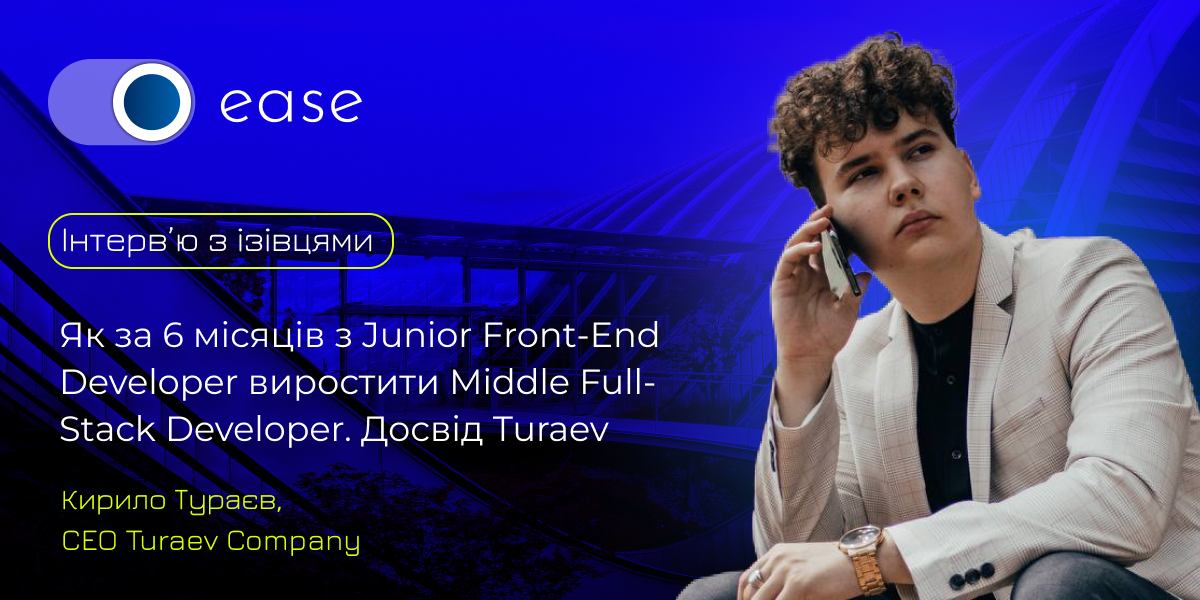
How to go from a Junior Front-End Developer to a Middle Full-Stack Developer in 6 months. Turaev’s Experience
The question of where to start a career in IT is probably one of the most widespread when it comes to the professional field. After all, not so many employers are ready to hire people without experience, but at the same time, no one wants to train them either. So how can you break the cycle of failure and start your IT journey? Kyrylo Turaev, CEO of Turaev Company, tells about his experience raising juniors to be middle, mentoring, and his school.
1) What are the problems of the IT market faced by the young generation?
The IT market is big enough to find a job to your liking. However, beginners sometimes face several problems they cannot handle on their own. At the moment, I can identify a few main ones:
- Low-quality courses for juniors
Before getting your first job, you need to learn the basics of programming. However, many online courses do not provide enough information and knowledge to prepare you for work. They don’t train full-stack developers who can independently develop simple applications from scratch. It is always either the basics of the front-end without Java Script or a number of frameworks needed for front-end development or JS courses, which have additional technologies. However, their number is insignificant, and a junior specialist still needs to learn much in companies. The following problem arises from this.
- No one wants to teach juniors
Even despite the war, many foreign companies enter the Ukrainian market. However, due to a reasonable budget, such companies immediately hire middles and seniors. Why? Because nobody wants to be engaged in high-quality juniors training. After the “courses,” you need to mentor them for several more months. However, finding a good mentor for a junior or assigning another developer to such a person is another challenging task. No one wants to wait for a junior to learn and grow professionally.
- A junior specialist will not get a good job
Even if a company hires a junior, their scope of work is the most straightforward task: rename a file, create/change a button, etc. Such beginners are not allowed to build something complex. This means that they will not face a challenge, will not create something new, will not receive valuable experience, and therefore will not grow into middle specialists. It is explained by the fact that the middle is the junior who has mastered all the necessary knowledge, received enough practice, and understood how to implement this or that functionality correctly.
- Generational difference
One way or another, a junior will face ageism. There are most companies on the market where the entire head of office consists of millennials. And being the youngest in a company of adults with a set work-life balance is quite tricky. I know it from my own experience. Currently, many juniors are just students aged 16-20, but at the same time, the positions of junior specialists are mostly given to people aged 27 and over.
I have a different vision. In my team, everyone is under 25, and, in my opinion, it is worth focusing on the younger generation. I think that in the future, many companies will be created and founded by Zoomers for Zoomers, which will have a different approach to work, a different motivation, and a different corporate culture.
2) What is the growing system of the Turaev Company?
I have my system, which I have been developing for four years. Its principles are the following: a junior with basic knowledge comes to me, and I teach this person all the additional technologies. Then, I give “architecture,” a code development methodology with practices. “Architecture” completely covers the issue of the junior’s understanding of how to write frontend and backend, how to work in a company, communicate, send reports, test, etc.
When juniors understand this “architecture,” they start working independently and writing perfect code just a few months after beginning practice. They do not make cardinal mistakes, can understand the code of other specialists, can do pair programming, etc.
When a person has looked at “architecture,” they begin to do practical projects. A practical project is not an urgent commercial project with much functionality. At this function, I train a person, and upon completion of the project, a junior receives part of the funds, the first salary.
The global essence of growing is that a person comes, completes the education, learns architecture, gets practical experience on commercial projects, and each time starts writing code better, working systematically, and therefore growing to the middle.
3) How to choose people for the growing system? What Soft and Hard skills are essential?
I suggest choosing people based on their soft skills. People from whom we want to make specialists should be motivated and have a great desire to learn and not to earn money from the first day of work. Those who have completed dozens of courses have work experience but do not have solid motivation – they are ineffective.
Here is my set of soft critical skills:
- motivation, which will help make learning quick and easy;
- critical thinking;
- the ability to absorb information in different formats equally well: text, audio, and video;
- the desire to spend time studying at least 40 hours a week.
If we talk about hard skills, then they are less important. A person who desires to learn will learn everything and acquire the necessary knowledge. Although you still need to have a base: HTML, CSS, and JavaScript.
4) How effectively should people be mentored and trained?
In fact, the crucial thing is a sincere desire to be a mentor and help a person dive into the IT world. The first job is always scary, even if you want it more than anything. So, a mentor who will show and tell everything must be a true professional not only in their work but also have good communication skills.
- Trust
To study well, a junior needs to trust completely. You constantly communicate and plan work and study time. The junior should listen, and the mentor should tell how to write this or that code correctly, where it should be edited, etc. Show an excellent example of mentoring, and years later, this junior will grow up to be a senior and start mentoring others, thanks to you.
- Quality calls/meetings
Micro-calls, where the mentor quickly gives information and leaves a junior to suffer fate with their thoughts and misunderstandings, are a failed plan. It should be an actual session: questions and answers, analysis of errors, and good theory with practice.
- Real tasks
Changing and rearranging the button is not a case of growing. To grow and start earning, the junior must have real commercial projects and tasks for the Middle developer. A person has to learn all processes in practice: from simple to complex and most complex. This is growth: a person receives a project, completes it, gains new knowledge, grows up in skills, gets money, gets pleasure and the desire to do more, and earns more.
5) What happens after a person has grown to a middle specialist? Where do they develop further?
There is always growth. After a junior has become a middle, s/he is promoted to team lead, who will mentor weaker juniors. When many newcomers come, a person can become the CTO of a separate department. It is a kind of circuit.
6) How are you currently building your Full Stack developer online school?
I am developing it based on my system. I do this with my developers, who have been through the same growing system. We are also building a school as part of a partnership with the UA-BRAINS educational company. We took it very seriously, so school graduates will have real work experience with which they can go to companies and not study but work fully.
In school, we will also teach based on my architecture. We will have large practical commercial projects where students will perform their work and receive their first money. This is our goal.
7) How can IT companies start growing profitable developers right now?
Firstly, you must understand the architecture and technologies you use in your work.
Secondly, it is necessary to digitize the company’s work processes and create instructions for developers to understand how it all actually works, what the regulations are, how to communicate with the team, etc. Every new employee must clearly understand their competencies to be as effective as possible.
Thirdly, you must package the course and materials used to grow developers because no one can say the same thing 100 times on Zoom calls. This is not a modern approach. Record the course once and update it as the company changes.
The fourth and no less important point is to find competent people in the team who will take on mentoring newcomers. They should be willing to answer questions, explain, and communicate. Also, hire people who are really eager to learn. Such a tandem of a responsible mentor and a keen junior will have good feedback in the form of a trained employee with the potential to grow to the middle.
And most importantly, give people real work tasks, and assign them commercial projects. If you take on training, teach the theory, but remember actual practice.
Only under such conditions can the junior become a middle in 6 months. If this did not happen, review all the above points again because you must have missed something.




